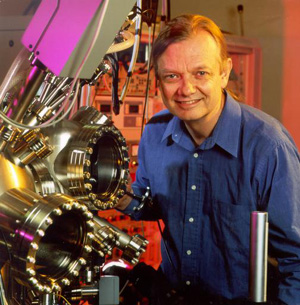R. Stanley Williams, a senior fellow at Hewlett-Packard Laboratories and founding director of HP's Quantum Science Research group, will discuss nanoscale computing in a free public lecture on Thursday, October 25, hosted by UC Santa Cruz's Baskin School of Engineering and Silicon Valley Center. Williams's talk, titled "Computing at the nanoscale will employ different physics and logic operations," will take place at 4 p.m. in the World Room, Building 943, NASA Ames Research Center.
This will be the final event in the Distinguished Lecture Series marking the 10th anniversary of UCSC's Baskin School of Engineering. Williams will describe several new results that have been achieved in the past year by his Quantum Science Research group, which is exploring new electronic-device concepts and logic operations.
According to Williams, as the size of electronic-device components continues to shrink to the scale of a few nanometers, the fundamental physics governing the properties of the electrons is becoming more quantum mechanical. Therefore, present-day circuit designs and concepts that implicitly regard electrons as classical objects are becoming less valid. Eventually, continued increases in computing capacity at fixed cost will require new device and logic concepts that explicitly incorporate quantum mechanics.
Established in 1994, the Quantum Science Research group is focused on preparing HP for the challenges and opportunities ahead in electronic, photonic, and mechanical device technology as features continue to shrink to the nanometer scale, where quantum mechanics becomes important.
Williams is one of just five active Senior Fellows at HP. For the past 30 years, his primary scientific research has been in the areas of solid-state chemistry and physics, and their applications to technology. This research has evolved into the areas of nanostructures and chemically assembled materials, with an emphasis on the thermodynamics of size and shape. Most recently, he has examined the fundamental limits of information and computing, which has led to his current research in nanoelectronics and nanophotonics.
Williams has received numerous awards for business, scientific, and academic achievement, including the 2004 Joel Birnbaum Prize (the highest internal HP award for research), the 2003 Herman Bloch Medal for Industrial Research, the 2000 Julius Springer Award for Applied Physics, the 2000 Feynman Prize in Nanotechnology, the Dreyfus Teacher-Scholar Award, and a Sloan Foundation Fellowship. He was named to the inaugural Scientific American 50 Top Technology leaders in 2002 and then again in 2005 (the first to be so named twice).
Williams has been awarded more than 50 U.S. patents and has published more than 280 papers in reviewed scientific journals. In 2005, Small Times magazine named the U.S. patent collection he has assembled at HP as the world's top nanotechnology intellectual property portfolio.
Williams received a B.A. in chemical physics from Rice University and Ph.D. in physical chemistry from UC Berkeley in 1978. He worked at AT&T Bell Labs from 1978 to 1980 and was a faculty member in the Chemistry Department at UCLA from 1980 to 1995.
Building 943 is located next to the NASA Exploration Center at NASA Ames (see directions).
For more information about this lecture, call (831) 459-2158 or e-mail drecept@soe.ucsc.edu. Information about this and other events at the Baskin School of Engineering is also available online.



